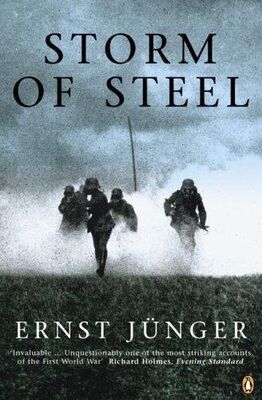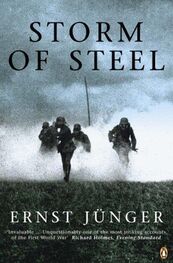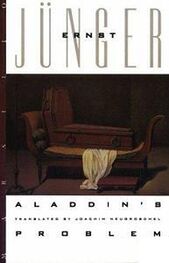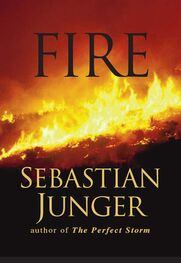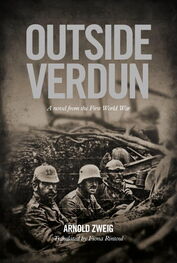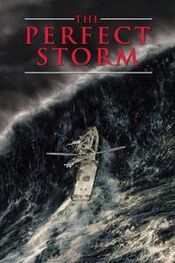Towards noon, the artillery fire had increased to a kind of savage pounding dance. The flames lit around us incessantly. Black, white and yellow clouds mingled. The shells with black smoke, which the old-timers called ‘Americans’ or ‘coal boxes’, ripped with incredible violence. And all the time the curious, canary-like twittering of dozens of fuses. With their cut-out shapes, in which the trapped air produced a flute-like trill, they drifted over the long surf of explosions like ticking copper toy clocks or mechanical insects. The odd thing was that the little birds in the forest seemed quite untroubled by the myriad noise; they sat peaceably over the smoke in their battered boughs. In the short intervals of firing, we could hear them singing happily or ardently to one another, if anything even inspired or encouraged by the dreadful noise on all sides.
In the moments when the shelling was particularly heavy, the men called to each other to remain vigilant. In the stretch of trench that I could see, and out of whose walls great clumps of mud had already been knocked here and there, we were in complete readiness. Our rifles were unlocked in the shooting-slits, and the riflemen were alertly eyeing the foreground. From time to time they checked to left and right to see whether we were still in contact, and they smiled when their eyes encountered those of comrades. I sat with a comrade on a bench cut into the clay wall of the trench. Once, the board of the shooting-slit through which we were looking splintered, and a rifle bullet flew between our heads and buried itself in the clay.
By and by, there were casualties. I had no way of knowing how things stood in other sectors of the labyrinthine trench, but the increasing frequency of the calls for
‘Ambulancemen!’ showed that the shelling was starting to take effect. From time to time, a figure hurried by with its head or neck or hand wrapped in fresh, clean and very visible bandages, on its way to the rear. It was a matter of urgency to get the victim out of the way, because of the military superstition by which a trifling wound or hit, if not immediately dealt with, is certain to be followed by something rather worse.
My comrade, volunteer Kohl, kept up that North German sang-froid that might have been made for such a situation. He was chewing and squeezing on a cigar that refused to draw, and apart from that looked rather sleepy. Nor did he allow himself to be upset when, suddenly, to the rear of us, there was a clattering as of a thousand rifles. It turned out that the intensity of the shelling had caused the wood to catch fire. Great tongues of flame climbed noisily up the tree trunks.
While all this was going on, I suffered from a rather curious anxiety. I was envious of the old ‘Lions of Perthes’ for their experience in the ‘witches’ cauldron’, which I had missed out on through being away in Recouvrence. Therefore, each time the coal-boxes came down especially thick and fast in our neck of things, I would turn to
Kohl, who had been there, and ask:
‘Hey, would you say this was like Perthes now?’
To my chagrin, he would reply each time with a casually dismissive gesture:
‘Not by a long chalk!’
When the shelling had intensified to the extent that now our clay bench had started to sway with the impact of the black monsters, I yelled into his ear:
‘Hey, is it like Perthes now?’
Kohl was a conscientious soldier. He began by standing up, looked about himself carefully, and then roared back, to my satisfaction:
‘I think it’s getting there!’
The reply filled me with foolish delight, as it confirmed to me that this was my first proper battle.
At that instant, a man popped up in the corner of our sector: ‘Follow me left!’ We passed on the command, and started along the smoke-filled position. The ration party had just arrived with the chow, and hundreds of unwanted mess-tins sat and steamed on the breastwork. Who could think to eat now? A crowd of wounded men pushed past us with blood-soaked bandages, the excitement of the battle still etched on their pale faces. Up on the edge of the trench, stretcher after stretcher was swiftly lugged to the rear. The sense of being up against it began to take hold of us. ‘Careful of my arm, mate!’
‘Come along, man, keep up!’
I spotted Lieutenant Sandvoss, rushing past the trench with distracted staring eyes. A long white bandage trailing round his neck gave him a strangely ungainly appearance, which probably explains why just at that moment he reminded me of a duck. There was something dreamlike about the vision – terror in the guise of the absurd. Straight afterwards, we hurried past Colonel von Oppen, who had his hand in his tunic pocket and was issuing orders to his adjutant. ‘Aha, so there is some organization and purpose behind all this,’ it flashed through my brain.
The trench debouched into a stretch of wood. We stood irresolutely under huge beech trees. A lieutenant emerged from dense undergrowth and called to our longest-serving NCO: ‘Have them fall out towards the sunset, and then take up position. Report to me in the dugout by the clearing.’ Swearing, the NCO took over.
We fell out in extended order, and lay down expectantly in a series of flattish depressions that some predecessors of ours had scooped out of the ground. Our ribald conversations were suddenly cut off by a marrow-freezing cry. Twenty yards behind us, clumps of earth whirled up out of a white cloud and smacked into the boughs. The crash echoed through the woods. Stricken eyes looked at each other, bodies pressed themselves into the ground with a humbling sensation of powerlessness to do anything else. Explosion followed explosion. Choking gases drifted through the undergrowth, smoke obscured the treetops, trees and branches came crashing to the ground, screams.
We leaped up and ran blindly, chased by lightnings and crushing air pressure, from tree to tree, looking for cover, skirting around giant tree trunks like frightened game. A dugout where many men had taken shelter, and which I too was running towards, took a direct hit that ripped up the planking and sent heavy timbers spinning through the air.
Like a couple of squirrels having stones thrown at them, the NCO and I dodged panting round a huge beech. Quite mechanically, and spurred on by further explosions, I ran after my superior, who sometimes turned round and stared at me, wild-eyed, yelling:
‘What in God’s name are those things? What are they?’
Suddenly there was a flash among the rootwork, and a blow on the left thigh flung me to the ground. I thought I had been struck by a clump of earth, but the warm trickle of blood indicated that I’d been wounded. Later, I saw that a needle-sharp piece of shrapnel had given me a flesh wound, though my wallet had taken the brunt of it. The fine cut, which before slicing into the muscle had split no fewer than nine thicknesses of stout leather, looked as though it might have been administered by a scalpel.
I threw down my haversack and ran towards the trench we had come from. From all sides, wounded men were making tracks towards it from the shelled woods. The trench was appalling, choked with seriously wounded and dying men. A figure stripped to the waist, with ripped-open back, leaned against the parapet. Another, with a triangular flap hanging off the back of his skull, emitted short, high-pitched screams. This was the home of the great god Pain, and for the first time I looked through a devilish chink into the depths of his realm. And fresh shells came down all the time.
I lost my head completely. Ruthlessly, I barged past everyone on my path, before finally, having fallen back a few times in my haste, climbing out of the hellish crush of the trench, to move more freely above. Like a bolting horse, I rushed through dense undergrowth, across paths and clearings, till I collapsed in a copse by the Grande Tranchee.
Читать дальше